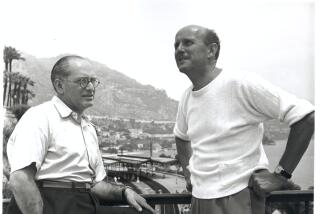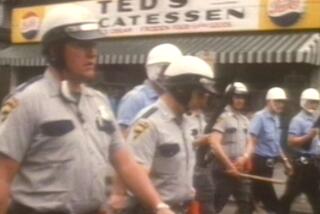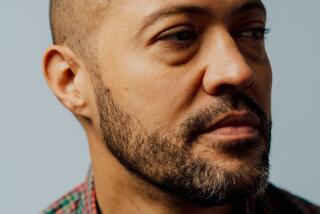John Ford, meet John Wayne
- Share via
The PBS series “American Masters” begins its 20th anniversary season tonight with “John Ford/John Wayne: The Filmmaker and the Legend,” an engaging dual critical biography of the director and the actor whose names are as tightly linked as any in moviedom. Ford, called “Pappy,” and Wayne, known as “Duke,” made more than a dozen films together, most of them westerns, including “Stagecoach,” “Fort Apache” and “The Searchers,” that are among the best films Hollywood ever produced, transcending genre to become something deep and complex and unpredictable.
As masters go, you can’t get any more obviously American than Ford (born Feeney) or Wayne (born Marion Morrison), who after the eagle, the flag and those heads up on Mt. Rushmore is possibly the next closest thing we have to a national symbol. (For good and for ill.) But, as this film relates, they were quite different men in outlook and politics, whose Americanism took radically different shape (until late in Ford’s life, when Vietnam War protests turned him increasingly conservative).
Directed by Sam Pollard (longtime Spike Lee editor) and written by Kenneth Bowser (“Easy Riders/Raging Bulls”), the film isn’t a complete examination of the work or life of either man but a look at what each brought out in the other across the course of their long and often spiky friendship and films together. The emphasis falls slightly more on Ford, who made the frame that made sense of Wayne -- in that first look at him in “Stagecoach,” as the camera rushes up to meet him, a star is born -- and was in fact the larger, more troublesome and demanding personality. (Wayne, by all accounts, at least by all accounts here, was a generous, gregarious and exceptionally good-tempered man.)
At the same time, it’s Wayne you want to look at. For all his famous “manliness” -- of which talking head John Milius speaks approvingly, though Martin Scorsese wonders more trenchantly what that actually means, “to be a man” -- there is a softness to him that takes the edge off him and gives even the most unlikable of his characters a human edge. (Ford too was reputed to be deeply sensitive beneath his hard-to-penetrate exterior and autocratic distancing strategies.) Commentators consistently speak of Wayne’s beauty and grace; critic Richard Schickel calls him “absolutely gorgeous,” and this is borne out by some striking pictures of the actor in his youth.
Along with Scorsese and Milius, there are comments from directors Peter Bogdanovich and Mark Rydell (who directed Wayne in “The Cowboys”); three Ford biographers; critics Schickel and David Thomson; various surviving members of the “Ford Stock Company” that the director carried from picture to picture; and descendants of Ford and Wayne. Each has lived with these films until they are like family.
The prints of Ford’s films as excerpted here are all pristine and striking; even when they lack narrative context, the pictures have a strong emotional effect and make you want to sink yourself into the body of work for a week or a month or a year.
*
‘American Masters’
Where: KCET
When: 9 to 10:30 tonight
Rating: TV-G (suitable for all ages)
More to Read
Only good movies
Get the Indie Focus newsletter, Mark Olsen's weekly guide to the world of cinema.
You may occasionally receive promotional content from the Los Angeles Times.











